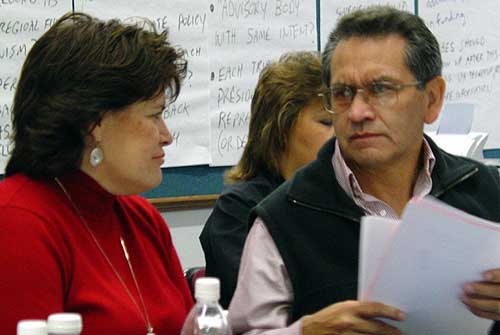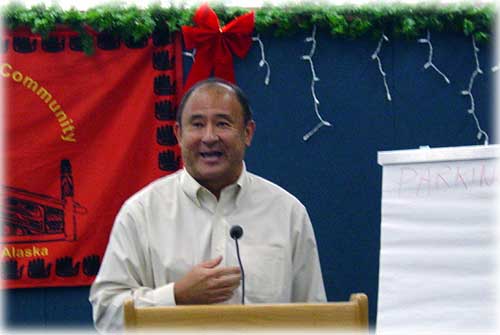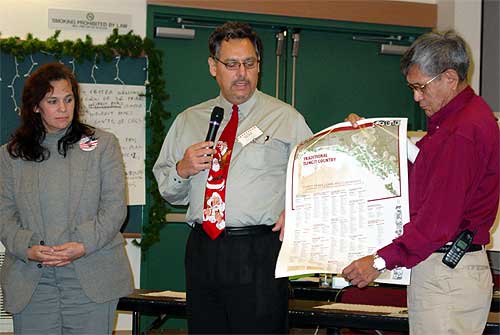 December 23, 2003
 Indians and Ed Thomas, President of Tlingit & Haida, Juneau... Photograph by Cheryl Haven Jacqueline Johnson, Executive Director of the National Congress of American Indians (NCAI), was the keynote speaker on Tuesday morning. NCAI is a national organization based in Washington, D.C. that coordinates communications among all Tribal governments. Johnson told the group NCAI serves as a forum for consensus-based policy development among its membership of Tribal governments in the United States. Johnson, an Alaska Native with her roots in Juneau Alaska, has an especially keen understanding of the make up and challenges of Southeast Alaska Tribes. Johnson said it is important for tribes to maintain their Tribal decision-making authority along with the responsibility and accountability for those decisions. Johnson spends much of her time working with the U.S. Congress, congressional committees and staff on behalf of Tribal governments all over the United States. Her suggestions for Tribal Leaders included requesting an educational forum with the Indian Affairs Committee instead of formalized hearings at this point. She confirmed that it is critically important for Tribes to be responsive to Senator Stevens. Johnson also suggested that it is important to draw close alliances with other regions in the United States such as California tribes who are also very concerned about their funding distribution.  Photograph by Cheryl Haven
Other prominent speakers included incoming Alaska State Senator Bert Stedman and Representative Bill Williams who are preparing for the next State Legislative Session. Captain Phil Taylor and Retired Captain Jan Sande spoke to the group regarding the impact to Southeast Alaskan communities in terms of both service and loss of employees with the new transportation plan that includes fast ferries designed for day runs only. Southeast Tribal Leaders from the Organized Village of Kasaan, Sitka Tribe of Alaska, Petersburg Indian Association, Central Council of Tlingit & Haida Indian Tribes of Alaska, Organized Village of Saxman, Metlakatla Indian Community, Douglas Indian Association, Skagua Tribal Council, Hydaburg Cooperative Association, Yakutat Tlingit Tribe, Organized Village of Kake, Craig Community Association, and Ketchikan Indian Community participated in the Summit either in person or by teleconference.  Photograph by Cheryl Haven
There were several suggestions discussed including a white paper showing tribal success stories. Such a paper proposes to respond to five concerns proposed by the Senator's Appropriations Chief of Staff, Lisa Sutherland: (1) indirect costs for Alaskan federal tribal programs are too high; (2) accountability for, and efficiency of, Alaska's federal tribal programs is inadequate; (3) inequities exist in how federally funded tribal programs are spread across Alaska; (4) not all Alaska Natives are eligible for all federally funded tribal programs in Alaska; and (5) there are "phantom villages" on the list of federally recognized tribes in Alaska. Southeast Tribes are very concerned that all tribes are painted with the same broad bush and not all of these concerns are applicable to most tribes.  Photograph by Cheryl Haven
KIC's CEO Georgianna Zimmerle, who moderated the sessions, said "before wrapping up a productive Southeast Tribal Summit in Ketchikan, Alaska, the group agreed upon a communication plan to continue their work." She said, "the next Congressional Session will be upon us in no time with Congress coming back from recess on January 20, 2004. Information needs to be sent to Senator Stevens no later than February, 2004."
Source of News Release & Photographs:
|